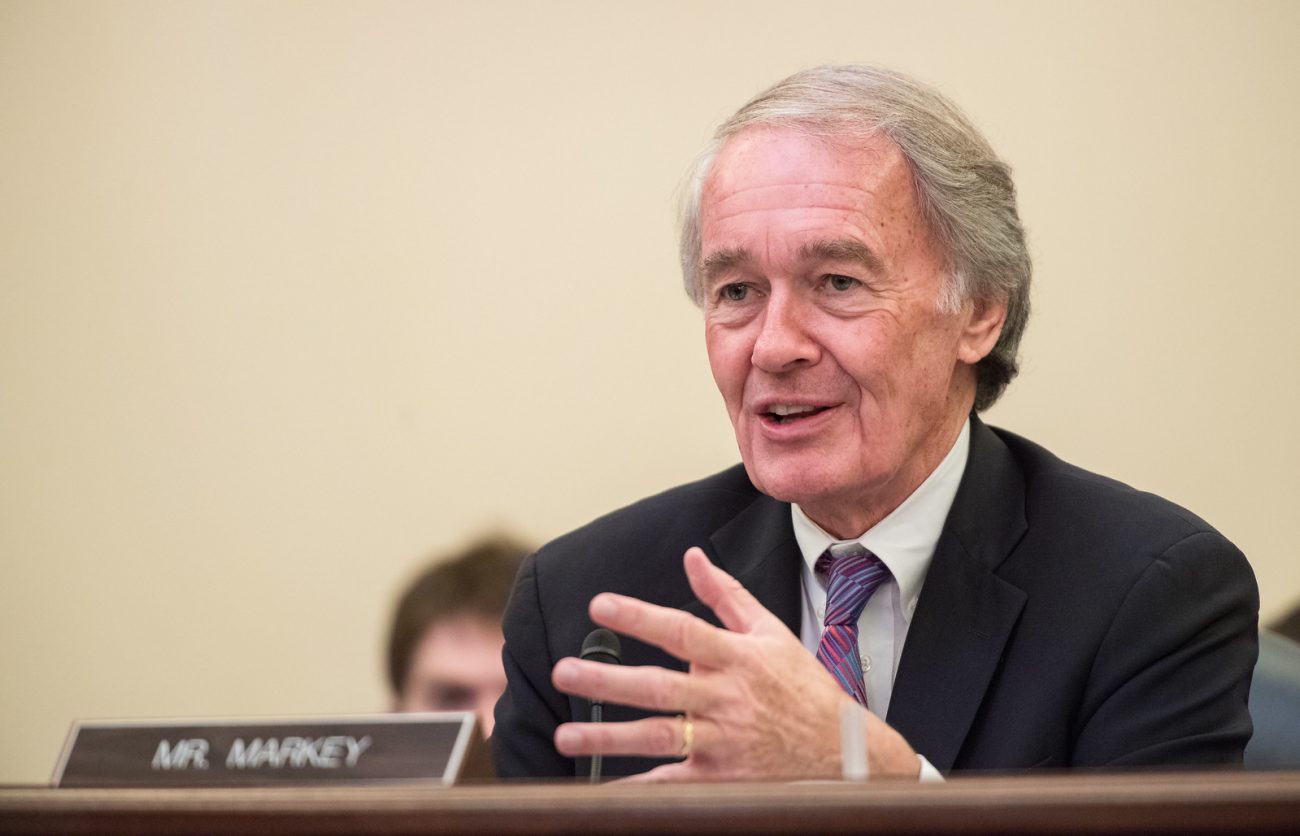Joe Biden Won’t Learn Anything From Ed Markey’s Win
For four decades Sen. Ed Markey was a run-of-the-mill liberal Democrat. But when he found himself threatened by a potentially career-ending defeat, he turned toward young voters and the Left — and it worked. Could Biden do the same? Maybe. But he probably won’t even try.

Sen. Ed Markey at a 2018 Senate subcommittee meeting on space and science. NASA HQ / Flickr
The New York Times’ Michelle Goldberg has a new piece on Ed Markey’s surprising and unorthodox primary victory and the lessons it might offer to other Democrats. Among other things, Goldberg’s op-ed gives useful insights into the pivotal role played by the Sunrise Movement, which accomplished nothing short of a stunning feat by transforming the seventy-four-year-old Markey into an unlikely champion for young progressive voters.
Her main point, however, has to do with the potential lessons the Massachusetts primary campaign has served up for mainstream Democrats everywhere, particularly Joe Biden: “In boosting Markey, Sunrise sent a message to Democrats, especially those in blue states. You don’t need an impeccable record — if you champion the Green New Deal, the movement will have your back. And that support can be priceless.”
I paid close attention to the Markey/Kennedy race, and I think Goldberg is right. Markey’s warm embrace of young progressive voters — not to mention their values, language, and legislative priorities — was essential to his victory. She’s also right that Markey, despite a partly overlapping constituency, is no Bernie Sanders. (I would very much quibble with her suggestion that Sanders is a “purist,” but that’s a discussion for another day).
Markey did, after all, vote to authorize the invasion of Iraq and support NAFTA. He even backed the USA PATRIOT Act back in 2001 (though voted against its reauthorization in 2005, 2010, and 2011). That he nonetheless won the respect of so many young left-wing voters therefore does yield an important lesson for other Democratic candidates and elected officials.
As former Sanders organizer Claire Sandberg put it earlier this week: “Corporate Democrats want to make the Left out to be purity-obsessed and unwilling to compromise, but the Left rallied around a longtime politician with a mixed record because he actively courted their support and became a champion of one of their major legislative priorities.”
Where I differ from Goldberg is in thinking that this is the kind of lesson a politician like Joe Biden either wants to or could conceivably learn. Near the end of her piece, Goldberg writes: “I hope Joe Biden listens. Young voters favor him over Trump by large margins, but their lack of enthusiasm could dampen turnout.” She quotes Sunrise’s Executive Director Varshini Prakash: “The best thing that Joe Biden could do would be to speak in clear, exciting visionary terms about exactly what he plans to do to tackle the climate crisis, racial inequality, and economic inequality.”
It’s a capital suggestion — and one Biden is certain to ignore. That’s because, whatever officially appears in the Democratic platform (Goldberg, for example, cites the recommendations of the Sanders/Biden joint task force) is entirely secondary to the political coalition Biden is trying to build, and the one he built to win the Democratic nomination.
Much like Hillary Clinton did in 2016, Biden is aiming to win the presidency by motivating conservative-leaning suburban voters and some Republicans — with more traditional (and liberal- and progressive-minded) Democratic constituencies turning out in sufficient numbers where it counts. The former group was largely the target audience for this year’s DNC, which pandered endlessly to the sensibilities of anti-Trump Republicans and rich suburbanites. The latter, meanwhile, gets lectures about how they need to be more enthusiastic while young voters get virtual Biden/Harris lawn signs in Animal Crossing instead of Medicare For All.
Centrist Democrats do want the support of young and left wing voters, of course. But they uniformly want it on their own centrist terms.
All this may be a strategic choice on Biden’s part, but it’s also a feature endemic to the faction that controls the Democratic Party as a whole. Biden’s nomination, which party power brokers ultimately did everything they could to ensure, represented a very conscious repudiation of the alternative course offered by Bernie Sanders — one which was decidedly less interested in the votes of suburban conservatives and, perhaps more importantly, which pledged to reject the dictates of the donor class that Democratic elites have long embraced.
As such, there is simply no incentive structure in place to shift Biden from his current course.
In Massachusetts, a hitherto quite conventional liberal politician recognized that it would be in his interest to harness the energy and power of young activists. He embraced their agenda and saved his career in the process. Whether Markey’s shift represented a sincere change of heart or pure political self-interest is a secondary matter: he faced an existential challenge and pivoted towards the only constituency he believed could save him from defeat. The young left, which Biden’s candidacy has always been about marginalizing and repudiating, enjoys no such leverage with Biden.
Goldberg is absolutely right to argue that the Markey campaign yielded real lessons for centrist Democrats. The problem is assuming those are lessons that centrist Democrats are under any real pressure to learn.